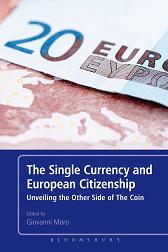Buti, M. and Padoan, P.C., (2013), “How to make Europe’s incipient recovery durable – A rejoinder”, VoxEU, 08 Οκτωβρίου. Our recent Vox column triggered an interesting and lively debate (see for instance Krugman, 2013; Fatas, 2013; Watt, 2013). In it, we argued that weak private investment is partly to blame for the growth shortfall of the Eurozone compared to the US in the past few years and that putting in …Read More
Europe: an end to fallacy
Duff, A. and Verhofstadt, G., (2013), “Europe: an end to fallacy”, European Politics and Policy Blog, 08 Οκτωβρίου. The Eurozone crisis has generated a number of structural reforms at the European level. In light of the democratic implications of some of these reforms, Andrew Duff and Guy Verhofstadt propose a new ‘fundamental law’ to replace the EU’s existing treaty framework. This incorporates a federal union in which the European Commission …Read More
Angela Merkel’s Pyrrhic Victory
Soros, G., (2013), “Angela Merkel’s Pyrrhic Victory”, Project Syndicate, 07 Οκτωβρίου. As far as Germany is concerned, the drama of the euro crisis is over. The subject was barely discussed in the country’s recent election campaign. Chancellor Angela Merkel did what was necessary to ensure the euro’s survival, and she did so at the least possible cost to Germany – a feat that earned her the support of pro-European Germans …Read More
European Media Distort the Lessons of Argentina’s Crisis and Recovery
Mercille, J., (2013), “European Media Distort the Lessons of Argentina’s Crisis and Recovery”, Social Europe Journal, 07 Οκτωβρίου. The European media have distorted the lessons of Argentina’s relatively successful response to its own economic crisis a decade ago, as newly published research documents in detail. This is not surprising, because the policies adopted by Buenos Aires were directly opposed to those currently favoured by European authorities, in particular the ECB …Read More
The Euro crisis and its impact on national and European social policies
Degryse, C., Jepsen, M. and Pochet, P., (2013), “The Euro crisis and its impact on national and European social policies”, European Trade Union Institute, Working Paper 2013.05, Οκτώβριος. This critical working paper looks at the series of political choices, circumstances and windows of opportunity that have enabled one particular vision of the model of EU monetary union to gain acceptance. In the context of this model, political union is not …Read More
Can demography explain Portugal’s growth slump before the crash?
Hugh, E., (2013), “Can demography explain Portugal’s growth slump before the crash?”, A Fistful Of Euros Blog, 06 Οκτωβρίου. The issue being raised revolves around the current acceleration of emigration from countries on the EU periphery, largely towards the EU core. Typically the emigrants are young educated people who can’t find work. There is nothing especially surprising in this, since the tendency has long existed for people to move from …Read More
The Single Currency and European Citizenship: Unveiling the Other Side of The Coin
Moro, G. ed., (2013), The Single Currency and European Citizenship: Unveiling the Other Side of The Coin, London: Bloomsbury Academic. Established in 2002, the Euro is now the currency of 17 countries used by over 335 million people daily. Although the single currency is much discussed in terms of macroeconomics and global finances, policymakers rarely address its impact on European citizenship in social, cultural, political, and everyday life economics terms. …Read More
The Legacy of Austerity in the Eurozone
De Grauwe, P. and Ji, Y., (2013), “The Legacy of Austerity in the Eurozone”, Centre for European Policy Studies, 04 Οκτωβρίου. The recent slight improvement in the GDP growth rates in the eurozone has led European policy-makers to proclaim victory and assert that the austerity programmes imposed within the eurozone are paying off. But is this really the case? In this Commentary Paul De Grauwe and Yuemei Ji argue that …Read More
Eurozone recovery: The world is not enough
Tilford, S., (2013), “Eurozone recovery: The world is not enough”, Centre for European Reform Blog, 03 Οκτωβρίου. The end of the eurozone’s long recession has been met with relief by its policy-makers, with some jumping on the news to justify their management of the eurozone crisis. They argue that the eurozone economy is on the mend, and the recovery will gain momentum over the coming quarter. If they are right, …Read More
How to form a more perfect European Banking Union
Ubide, A., (2013), “How to form a more perfect European Banking Union”, Peterson Institute for International Economics, Policy Brief, PB13-23, Οκτώβριος. The euro area has made significant strides in the last six months in designing a banking union. The goal has been to centralize supervisory decision making and improve the management of failing banks while protecting European taxpayers and imposing costs on creditors through so-called bail-ins to reduce moral hazard. …Read More





